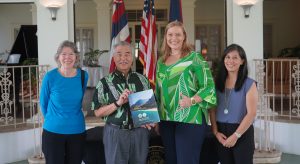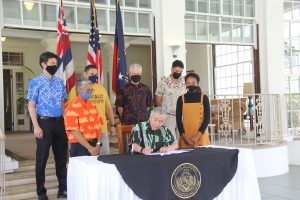Taking action on Hawai‘i 2050 Sustainability Plan
Posted on Jul 29, 2021 in Capitol Connection, Featured, MainWhen it comes to climate change and protecting our environment, actions speak louder than words. That message of collective action was delivered last month when Governor Ige signed a suite of bills into law addressing local food production, sea level rise and economic diversification. “I applaud the Legislature’s focus on sustainability issues this session,” the governor said. “The bottom line is we have a collective commitment to meeting Hawai‘i’s sustainability and climate goals.”
The bills have taken on new urgency as the state recovers from COVID-19 and highlights Hawai‘i’s need for greater self-sufficiency. “Our vision includes a diversified economy rebuilt sustainably, not a simple return to business as usual,” said the governor. The 10-year update of the Hawai‘i 2050 Sustainability Plan provides a roadmap for such priorities as reducing greenhouse gas emissions, improving climate resiliency and perpetuating traditional ecological knowledge and values.
-
Increasing demand for local food products to benefit both growers and consumers: HB767 establishes a farm-to-school goal of at least 30% local products by 2030. HB817 establishes benchmarks for state departments to purchase local agricultural or food products. SB512enables SNAP recipients to continue using the popular Double Up Food Bucks to buy locally grown fruits and vegetables.
- Addressing impacts of sea level rise: HB243requires state agencies to identify facilities vulnerable to sea level rise and flooding and develop plans to minimize the impact of these threats. SB474 requires anyone selling a home to disclose if the property lies within a sea level rise exposure area. This bill puts Hawai‘i on the leading edge of addressing coastal erosion impacts.
- New economic activity and green jobs: HB683 establishes a sustainable aviation fuel program to provide grants to small businesses developing products. HB1176 creates a green job corps program in the Department of Land and Natural Resources to work in fields such as natural resources management, agriculture, conservation and renewable energy.

